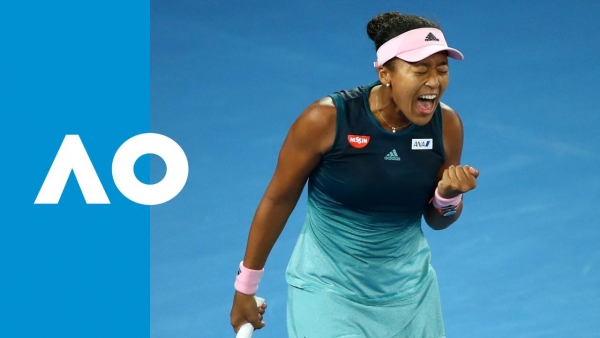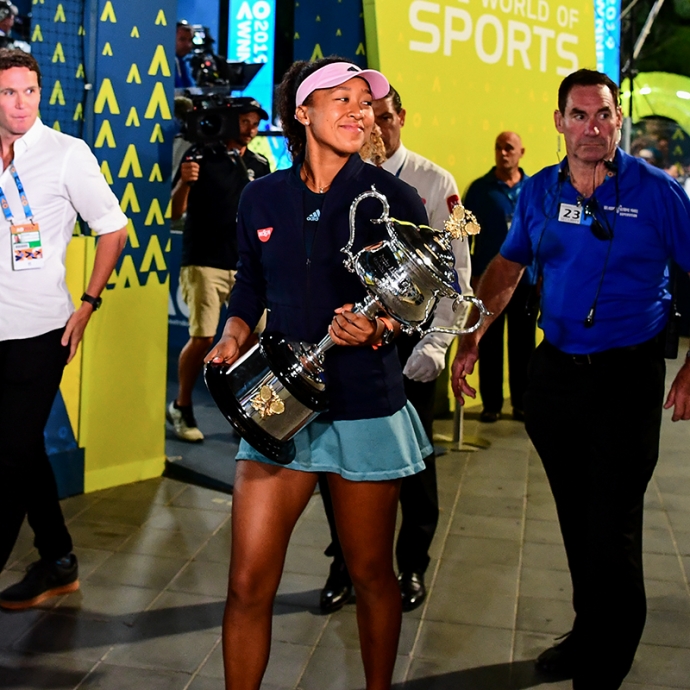In the space of just 12 months, Naomi Osaka has gone from a quirky player with a cult following among a niche of hardened WTA fans to a global superstar armed with two major titles and the world No.1 ranking.
It’s a simply remarkable transformation.
To everyone, that is, except the Japanese 21-year-old herself.
“I mean, to me, it doesn't (feel like it’s happened quickly),” she said after beating Petra Kvitova in three compelling sets to win her first Australian Open title.
MORE: Osaka wins AO title, takes No.1 ranking
“I guess looking from the outside, from your guys' view, it does. But I'm aware of all the work that I put in. I know all the sacrifices that every player does to stay at this level. I mean, in my opinion, it didn't feel fast. It felt kind of long.”
When looking at what Osaka has achieved, it is perhaps no surprise. When she emerged four-and-a-half years ago to beat then top-20 star Sam Stosur at the WTA event in Stanford, she caught the attention of several WTA fans.
They noted her exceptional serve, explosive power, dynamic athleticism and poise on the big stage, all ingredients essential to success at the top of the sport. Many people predicted she would one day become a star.
Yet she was raw. Self-described as erratic, and negative. Intensely introverted. These were hurdles she would have to overcome on her tennis journey.
And in the past year, she did.
With a solid team assembled around her led by coach Sascha Bajin, Osaka won her first ever tour-level title at Indian Wells last March. Six months later, she won her second at the US Open, capping a dominant fortnight at Flushing Meadows by dismantling Serena Williams in an infamous final.
She arrived at Melbourne Park as the world No.4 and with a far larger profile than ever.
But unlike many first-time major champions in recent history in the women’s game, this didn’t seem to faze her.
“I just focus on tennis. Like, for me, when I play my match, everything else is completely not in my mind anymore,” she said.
“For me, Grand Slams is something you dream about playing as a kid. I don't ever want to waste this opportunity. So those are the biggest motivating factors for me.
“Regarding media (spotlight) and stuff, honestly you guys have been really nice to me. I feel like when I was (ranked) 40 or 70, I got way more media than I should have been getting.
"I was kind of used to it.”
After reaching the fourth round of the Australian Open last year when ranked No.72, Osaka will ascend to No.1 come Monday – making her the highest-ranked Japanese player in history.
She’s the first player since Jennifer Capriati in 2001 to win her first major title and follow up with her second at the very next one. She owns 14 Grand Slam match wins in a row, and has now won 60 straight matches after winning the first set.
And she’s now the pre-eminent force in women’s tennis.
“I feel like it hasn't really sunk in,” admitted Osaka, who snapped a streak of eight different female Grand Slam champions in the past two years.
“Maybe in the next tournament I play, if I see the No.1 next to my name, I'll feel something. But for now, I'm more happy that I won this trophy.
“I would assume my next goal is to win the next tournament I play. Like, I'm going to have to play Indian Wells again. Of course, I'd love to win that again and then play Miami and hopefully win that. I think people that can win Indian Wells and Miami back-to-back, it's usually the best players in the world.
“I feel like I'm going with the flow. That's sort of been my motto my whole life.”
More titles and accolades are surely to come.

